Newsroom
Undeveloped Land: The Pros and Cons
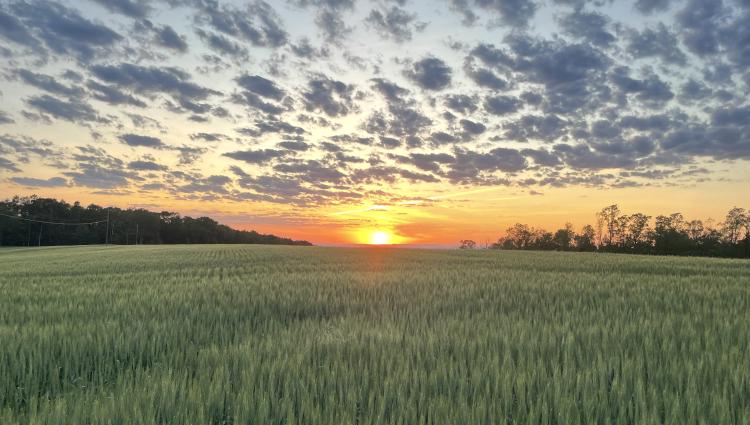
What is Undeveloped Land?
Undeveloped land refers to property that has not been developed upon with structures, utilities, or significant human modification. It’s often called raw land, vacant or bare land, and is typically found in rural areas or on the outskirts of developed communities. Since it may lack utilities like water, electricity, and sewage systems, undeveloped land requires additional work before it can be used for construction or farming but can be a high return investment.
Pros of Buying Undeveloped Land
Buying undeveloped land offers several key benefits for buyers seeking flexibility, cost savings, and investment potential.
Lower Purchase Price
One of the most appealing aspects of purchasing land for sale that’s undeveloped is its lower purchase price compared to developed land, since it doesn’t have any existing infrastructure. This makes it a cost-effective option for buyers on a budget or those looking for investment opportunities.
Flexibility
Owning a piece of bare land gives you the freedom to build what you want, how you want. Unlike purchasing a pre-built home or commercial property, raw land allows for full customization. Whether you’re planning to construct a home, farm, or business, the possibilities are virtually limitless – provided you adhere to local zoning laws.
Potential for Increased Value
Land values often appreciate over time, especially in areas with high growth potential. By purchasing undeveloped land in rural areas or regions experiencing population growth, buyers may see a substantial return on their investment over time.
Cons of Buying Undeveloped Land
While the flexibility and lower price of bare land are appealing, there are potential drawbacks that buyers should understand before making a purchase.
Development Costs
Unlike developed land, it requires significant investment to make it usable. Development costs may include:
- Installing utilities like water, electricity, and sewage.
- Constructing access roads.
- Preparing the site for construction with grading, excavation, and clearing.
These costs can quickly add up, so it’s essential to plan for them in your budget. A construction loan may be a good option for funding development projects.
Zoning and Building Restrictions
Local zoning laws dictate what types of structures can be built on the land. For instance, you may not be able to build commercial structures in a residential zone. Always research local zoning laws before purchasing undeveloped land – it might be undeveloped for a reason.
Accessibility and Infrastructure
Access to roads, utilities, and essential services can be limited for undeveloped land in rural areas. Buyers should investigate whether the land has access to existing infrastructure or if they’ll need to invest in creating access points.
Purchasing Undeveloped Land in the Mid-Atlantic Region
The Mid-Atlantic region – which includes Delaware, Maryland, Pennsylvania, Virginia, and West Virginia – offers a wide range of opportunities for buying undeveloped land. This region features diverse landscapes, from open farmland to wooded lots. With loan options to finance the purchase of undeveloped land, this region is ideal for private homesteads or farming properties.
Considerations for the Mid-Atlantic Region:
- Zoning Laws: Each state has specific zoning regulations that may limit how undeveloped land can be used. Researching local zoning laws is crucial.
- Rural Appeal: The Mid-Atlantic is known for its scenic, rural areas, and access to several major metropolitan areas, making it an attractive option for those looking to escape urban life or start a farm, while being close to amenities.
Horizon Farm Credit offers financing options for buyers seeking to purchase land in this region. Our expertise in local land requirements helps you navigate the complexities of undeveloped land purchases.
Horizon Farm Credit’s Role in Financing Undeveloped Land
Financing the purchase of undeveloped land is different from buying a home or real estate. Since bare land doesn’t generate immediate income, lenders view it as a higher-risk investment, often requiring a larger down payment.
Fortunately, lenders like Horizon Farm Credit specialize in land loans for rural properties, recreational and agricultural purposes. With a strong understanding of the Mid-Atlantic market, Horizon Farm Credit offers personalized loan guidance, ensuring buyers get the financing they need to purchase undeveloped land.
Tips for Buying Undeveloped Land
- Do Your Research: Research the land’s zoning regulations, accessibility, and local development plans.
- Negotiate a Fair Price: Don’t assume that vacant land is priced fairly. During the loan application process, our team will order an appraisal and if it under appraises, you can renegotiate with the seller.
- Consult a Land Planner: A land planner or engineer can help you understand the potential uses of the land and assess its development potential.
Key Takeaways
Undeveloped land offers flexibility, affordability, and long-term investment potential. Buyers can build homes, farms, or other custom projects that suit their specific needs. However, there are also challenges, such as development costs, zoning regulations, and access to infrastructure.
If you’re considering buying undeveloped land consider partnering with us – we were created for agriculture and rural America. Our land loan services provide competitive interest rates, flexible terms, and local expertise in the Mid-Atlantic region. Contact us today to get started!
Please enter a valid password to access this page:
Wrong password. Try again!Newsroom
Dairy Robot Loans: Financing the Future of Farming
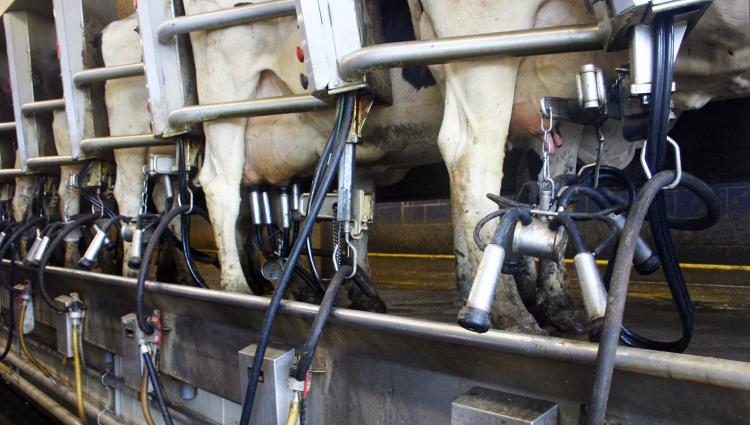
The Rise of Automation in Dairy Farming
Dairy farming has come a long way from the days of hand milking and manual labor. Today, automation is transforming the industry, making operations more efficient, productive, and sustainable.
Dairy robots, also called robotic milkers, are leading this revolution, handling milking, feeding, and even monitoring cow health with precision. These machines boost milk production, reduce labor costs, and allow farmers to focus on the bigger picture - growing their business.
The Financial Challenge of Dairy Robots
Advanced technology comes at a price, and dairy robots are no exception. Between the cost of the equipment itself, installation, and required improvements to existing infrastructure, upgrading to this level of automation requires serious investment and usually, existing strong equity, plus an established track record of cow performance and cash flow. The financial commitment can be daunting, especially for small and mid-sized dairy farmers.
Without the right funding, many dairy farmers put off modernization - potentially losing out on increased efficiency and profitability. Securing the capital to integrate robotics into dairy operations can be a major barrier, especially for farmers operating in Delaware, Pennsylvania, Maryland, Virginia, and West Virginia.
Dairy Loans as a Solution
For farmers ready to take their dairy operations to the next level, a dairy farm loan offers a strategic path to acquiring dairy robots. These financing options provide the resources needed to invest in technology without putting undue strain on cash flow.
Horizon Farm Credit specializes in tailored dairy loans, helping dairy farmers secure the funding they need. With flexible financing options, competitive interest rates, and loan structures designed to accommodate the unique demands of dairy farming, these loans help bridge the gap between innovation and affordability.
The Benefits of Dairy Loans
A well-structured dairy farm loan provides:
- Competitive interest rates to keep borrowing affordable.
- Flexible repayment terms that align with the cyclical nature of dairy farming income.
- Preserved cash flow, keeping capital available for day-to-day farm operations.
- Scalability, allowing farmers to invest in technology that grows with their business.
How to Apply for a Dairy Loan with Horizon Farm Credit
Navigating the dairy loan application process can seem complex, but Horizon Farm Credit simplifies every step:
- Determine financing needs – Assess the total cost of the dairy robots, including installation and integration expenses.
- Complete a loan application – Provide financial details, farm operations data, and future growth plans to assess eligibility.
- Submit necessary documentation – This may include tax records, farm revenue reports, and a business plan.
- Receive funding and implement automation – Once approved, move forward with integrating dairy robots into your farm.
Supporting New Entrants into Farming
For those just getting started in dairy farming, access to capital is one of the biggest obstacles. Without financial support, it’s tough to break into an industry that requires significant infrastructure and equipment investments.
Horizon Farm Credit is committed to helping the next generation of farmers and ranchers. With specialized financing options, educational resources, and mentorship programs, beginning farmers can take advantage of modern technology without being held back by financial constraints.
Additionally, programs through the Farm Service Agency can offer extra support for new dairy producers looking to establish a strong foundation.
The Future of Farming: A Look Ahead
With continued advancements in automation, dairy operations will continue to become more efficient, sustainable, and profitable. Tailored financing solutions will remain critical in making these technologies accessible to every dairy farmer, so farms can keep meeting the growing demands of the dairy industry.
Find Out How We Can Help
Thinking about upgrading your dairy farm with robotic technology? Choose a partner that knows and understands the dairy industry. We also have a team of expert consultants that can help you analyze your operation’s cash flow and determine whether or not this investment and a dairy loan may be right for your operation. Contact us to explore financing options and start your loan application today.
Please enter a valid password to access this page:
Wrong password. Try again!Newsroom
Grow Your Farm with Flexible Irrigation Loans
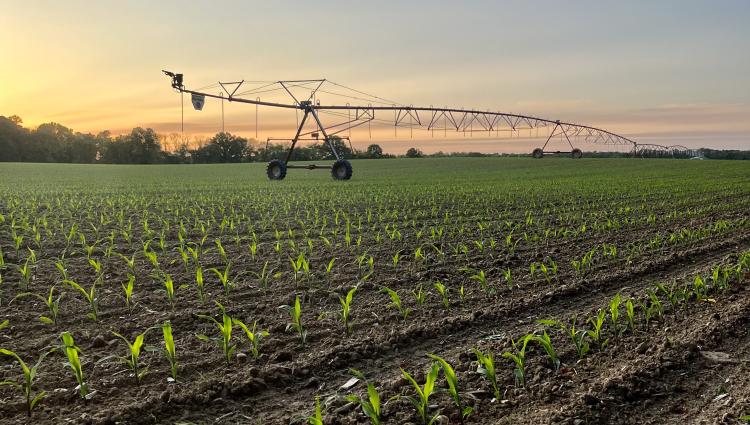
The Importance of Irrigation in Successful Farming
Keeping crops healthy and thriving starts with a dependable water supply. Whether you’re growing row crops, orchards, or specialty produce, consistent and well-managed irrigation systems can increase yields, improve crop quality, and reduce risk.
Farmers today have more irrigation system options than ever, from traditional furrow irrigation to modern drip and pivot systems. Choosing the right setup depends on crop type, climate, and soil conditions. But there’s one thing all systems have in common - cost. Upgrading or installing a new irrigation system requires significant investment, and that’s where a flexible irrigation loan comes in.
The Financial Hurdle of Irrigation Systems
Efficiency doesn’t come cheap. The upfront costs of installing an irrigation system - including pumps, pipes, reservoirs, and automation technology - can be steep. Even for farmers who see irrigation as their top priority, securing the funds to upgrade their system can be a financial challenge, but the right lender can help you through the process.
Farmers in Delaware, Pennsylvania, Maryland, Virginia, and West Virginia often face additional financial hurdles, with fluctuating water access, unpredictable weather patterns, and rising infrastructure costs. Investing in a reliable irrigation system is essential, but many farmers hesitate due to high initial expenses.
Irrigation Loans: A Tailored Financial Solution
Irrigation loans offer a practical way to finance water system improvements without draining working capital. These financing options provide the funds needed to install or upgrade an irrigation system while allowing farmers to spread the cost over time. Cash flow is protected, and upfront costs are reduced.
Horizon Farm Credit understands the unique financial needs of farmers and ranchers, offering flexible irrigation loan agreements designed to support water-efficient farming. Whether it’s replacing outdated infrastructure or installing a brand-new system, these loans help farmers optimize water use without sacrificing financial stability.
Advantages of Irrigation Loans
An irrigation loan does more than just cover costs - it helps build the foundation for a more profitable farm. Some benefits include:
- Competitive interest rates, making borrowing more affordable.
- Flexible repayment terms that align with seasonal income cycles.
- Preserved cash flow, so you don’t have to dip into operating funds.
- Increased farm productivity, from better water management and higher yields.
Many farmers have seen the real-world benefits an irrigation loan can provide. From reducing water waste, improving soil moisture consistency, and making better use of natural resources, irrigation loans improve farm efficiency to put more money back into your pocket.
Navigating the Application Process for an Irrigation Loan
Applying for an irrigation loan with Horizon Farm Credit is straightforward. The process includes:
- Assessing financing needs – Determine the size and cost of the irrigation system - don’t forget about installation costs.
- Completing a loan application – Provide financial details and business plans for loan approval.
- Submitting necessary documentation – This may include tax returns, farm revenue reports, and project cost estimates.
- Receiving funding and implementing the system – Once approved, put the financing to work and start optimizing your water usage.
We also offer financing at certain dealerships through our Farm Credit EXPRESS program that make every step of the process quick and easy.
Empowering the Next Generation of Farmers
For new and beginning farmers, water management is one of the most important things to get right. However, many young farmers struggle to afford expensive irrigation systems early in their careers.
Horizon Farm Credit offers specialized support for new farmers, including financial planning, mentorship programs, grants, and irrigation loan options tailored to beginner needs.
The Future of Farming: Embracing Efficient Irrigation
Unpredictable weather and increasing water conservation concerns are only emphasizing the importance of efficient water use. Advances in irrigation technology - such as automated drip systems, soil moisture sensors, and AI-driven water management - are revolutionizing farm efficiency.
Evaluating your potential cash flow with a lending professional can mitigate risk and alleviate stress when making the best financial decisions for your operation. The right financing option can make modern water management accessible, allowing farms to adapt new technologies and thrive for years to come.
Upgrade Your Irrigation with Flexible Financing
Ready to upgrade your irrigation system? A flexible irrigation loan from Horizon Farm Credit could be the solution. Contact us to explore financing options, competitive interest rates, and tailored irrigation loan agreements today.
Please enter a valid password to access this page:
Wrong password. Try again!Newsroom
Short-Term Operating Loans: A Farmer’s Guide to Seasonal Success
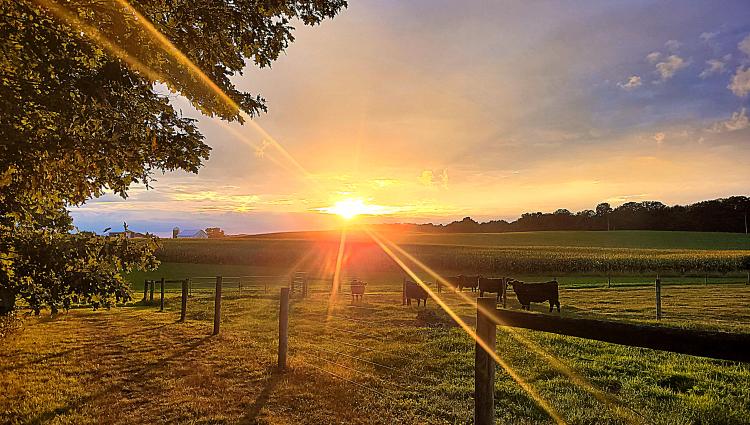
The Role of Cash Flow in Successful Farming
Planting crops and raising livestock aren’t the only aspects of running a successful operation – you need to be able to manage cash flow. Cash flow keeps everything running – from laying seeds to feeding animals and fueling equipment. It’s at the center of every business, and just as important to your farm’s finances as any other operation.
Farm income has one unique feature that can make managing cash flow particularly challenging – it’s highly seasonal. The start of a season may bring a raft of new expenses, and it often takes months to see the financial returns of your farming efforts. That’s where smart financial tools, like a farm operating loan, can bridge the gap.
Cash Flow Challenges in the Farming Season
Every farming season presents a new financial puzzle. Planting requires upfront costs for seeds, fertilizer, and equipment repairs. Harvest might bring a windfall, but it can be highly variable and only comes after months of expenses.
Farmers in Delaware, Pennsylvania, Maryland, Virginia, and West Virginia often navigate fluctuating land values and unpredictable market prices, making cash flow even trickier to manage. Without enough working capital, day-to-day operations can stall, putting your entire farm business at risk.
Short-Term Operating Loans: A Solution for Seasonal Success
Short-term farm loans, also known as operating lines of credit or operating loans, are a type of agricultural loan that offer a safety net when expenses come due before revenue arrives. These loans cover operating expenses, allowing farmers to manage seasonal operation costs without draining their savings, and until operational income becomes available to pay down the line of credit in full.
Horizon Farm Credit offers tailored short-term farm loans designed to meet the unique needs of farmers and ranchers. Whether it’s purchasing livestock feed, repairing machinery, or paying labor expenses, these loans help smooth out cash flow disruptions.
Benefits of Short-Term Operating Loans
Taking out a short-term agricultural loan, or line of credit, isn’t just about covering costs; it’s about keeping the farm running smoothly. Some benefits include:
- Quick access to funds when urgent expenses pop up.
- Financial flexibility so you can control your finances, not the other way around.
- Tailored repayment terms that align with seasonal income patterns.
- Competitive interest rates that make borrowing affordable.
Farm or ranch operators know that financial stability is just as important as soil quality or genetics. Short-term farm loans provide the resources needed to seize opportunities, like buying fertilizer in bulk when prices dip or hiring extra hands during peak harvest.
Applying for a Short-Term Operating Loan with Horizon Farm Credit
Horizon Farm Credit simplifies the loan application process with a step-by-step approach:
- Determine the loan amount needed for seasonal operations.
- Complete the loan application with farm financial details.
- Gather required documents, such as tax returns and business plans.
- Receive funding and put it to work, keeping your farm productive.
Empowering New Farmers with Short-Term Operating Loans
Starting a farm takes more than a plan – it takes capital. Many new farmers don’t have deep savings or extensive credit histories to fund operations when money isn’t coming in. Horizon Farm Credit offers farm ownership loans and farm loan programs that help beginners break into the industry. Resources like financial planning assistance, mentorship programs, and special loan options make it easier than ever to start strong.
Looking Forward: The Future of Farming with Short-Term Operating Loans
Farming will always come with financial ups and downs, but smart financing solutions help farmers stay ahead. With seasons becoming increasingly unpredictable, short-term operating loans will remain a crucial tool for managing seasonal cash flow, securing equipment, and investing in expansion. The right support lets farmers and ranchers focus on what they do best – feeding communities and growing their businesses.
Keep Your Farm Running with the Right Financing
Need funding to keep your farm running smoothly? A short-term operating loan might be the perfect fit. Your farm’s success starts with the right financial partner – contact us to get started today.
Please enter a valid password to access this page:
Wrong password. Try again!Newsroom
Agriculture loans for Solar Power Uses
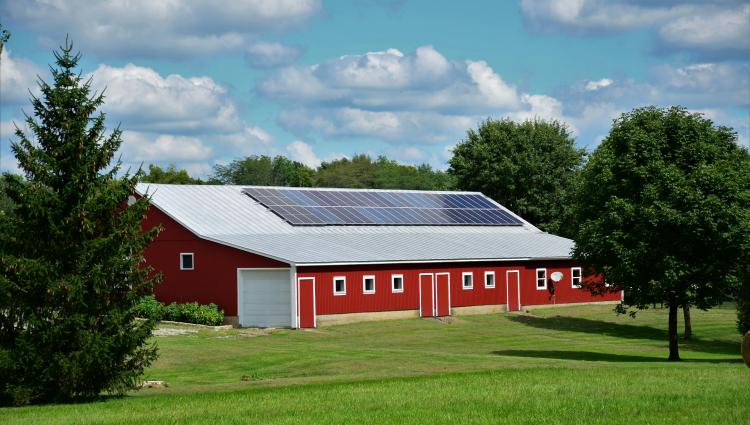
Why Solar Power is Essential for Agriculture Today
With rising energy costs and fluctuating utility rates, many farmers are turning to novel solutions to power their operations or homes that don’t dig into their bottom line. Solar power has emerged as a game-changer for agriculture, offering affordable, clean energy that reduces operating expenses and increases energy independence.
From running irrigation systems to powering grain drying and greenhouse operations, solar energy is transforming modern farming. To support these projects, solar power loans provide the financing farmers need to invest in renewable energy.
Financing Solar Power for Agricultural Operations
Farmers have access to various loans and financing options that make it easier to fund the purchase and installation of solar systems.
Types of Solar Power Loans
- Secured Loans: These loans use farm assets as collateral, offering borrowers access to larger loan amounts and lower interest rates.
- Equipment-Specific Loans: Tailored for renewable energy systems, these loans allow farmers to access funds specifically for equipment and solar panel installation.
Grants and Incentives
In addition to loans, farmers can lower project costs by tapping into state, federal, and local incentives. A word of caution: Be sure to read the details of these programs in their entirety before making your decision – these programs and how they run are often dependent on the administration currently in power and may change in the future. Due to the fluctuation in programing, your solar equipment provider can also be a good resource for program availability and eligibility.
- USDA Rural Development Energy Programs: The USDA offers a variety of programs incentivizing businesses to make energy efficiency improvements.
- State Incentives for Renewables: Each state offers unique programs to promote the adoption of renewable energy. These may include rebates, tax incentives, and loan support for solar power projects.
- Federal Tax Benefits: Depending on eligibility, farmers can claim the Modified Accelerated Cost Recovery System (MACRS), which allows for accelerated depreciation of renewable energy equipment, lowering overall tax liability.
By combining grants, incentives and loans, farmers can reduce out-of-pocket costs, making solar power more affordable and accessible.
Evaluating Solar Power Loan Providers
Choosing the right lender is crucial for securing the best rates and terms. Here’s what business owners should consider:
- Interest Rates: Competitive interest rates are essential for keeping monthly payments manageable. Fixed rate loans can ensure predictable payments.
- Loan Terms: Depending on the lender you go with, loan terms can range from short-term to long-term agreements. There are also loan-specific features like deferred or interest-only payments during system installation.
- Specialized Agricultural Lenders: Lenders like Horizon Farm Credit offer tailored loans for agricultural needs, which cater to agricultural clients in Delaware, Maryland, Pennsylvania, Virginia, and West Virginia. We know each farm is unique and we are ready to help you determine the feasibility of your investment in solar.
Steps to Secure a Solar Power Loan
If you’re ready to invest in a solar power system, follow these steps to explore and secure financing for your farm.
Assess Your Energy Needs
Start with an energy audit to determine how much power your farm needs and how a solar panel system can meet those requirements. This step ensures you install the right-sized system to maximize energy savings.
Select a Solar Installer
Work with experienced solar providers who specialize in farm installations. Look for contractors who understand farm-specific and USDA program requirements.
Prepare Your Loan Application
You’ll need to provide documentation including your financial history, energy use data, proof of grant eligibility, and construction plan.
Long-term Benefits of Solar Power in Agriculture
Investing in solar power offers significant long-term benefits for farmers and agribusinesses.
- Financial Savings: Solar energy reduces farm electricity bills and stabilizes energy costs, providing consistent savings over time.
- Tax Benefits and State Incentives: By using the MACRS depreciation system, farmers can recover a portion of the system's cost as a tax deduction. Additional state incentives for renewables can further reduce costs.
- Energy Independence: Relying on on-site renewable energy reduces exposure to utility price fluctuations and increases farm sustainability.
Ready to explore financing options for a solar investment for your farm? Contact a member of our team today to get started.
Please enter a valid password to access this page:
Wrong password. Try again!Newsroom
Horizon Farm Credit Announces Annual Results for 2024
Mechanicsburg, PA — Horizon Farm Credit, a member-owned cooperative and part of the national Farm Credit System, recently reported strong financial results in its 2024 annual report. The continued growth in loans and solid earnings will allow Horizon Farm Credit to distribute $72.3 million in patronage dividends to member-borrowers based on 2024 earnings.
The Association’s record-breaking net accruing loan volume grew to over $7.2 billion, an increase of approximately 10% compared to over $6.5 billion at the end of 2023. Net interest income for 2024 was $195.4 million, an increase of 11.5% compared to $175.4 million for 2023. Net income grew to $131.8 million, a 0.06% increase compared to $131.7 million in 2023. Credit quality continues to remain strong with acceptable credit quality at 95.8% for the end of 2024.
“Our strong financial performance reflects the trust our members place in us and our commitment to delivering reliable credit and financial services,” said Tom Truitt, CEO of Horizon Farm Credit. “As we close another successful year, we remain dedicated to strengthening agriculture and rural communities, ensuring they have the resources they need to grow and thrive for generations to come.”
Members’ Equity as of December 31, 2024, totaled $1.26 billion, an increase of 4.7%, compared to $1.2 billion in 2023. This strong equity position allows the Association to finance members’ growth even during industry challenges. In 2025, Horizon Farm Credit will be distributing $72.3 million of its 2024 earnings in cash patronage directly to its member-borrowers.
“Returning value to our members through our patronage program is one of the most rewarding aspects of what we do,” said Truitt. “Sharing our Association’s success is a testament to our cooperative structure and our commitment to supporting the farmers, agribusinesses, and communities we serve.”
For more information about the 2024 financial results and to view the Association’s 2024 Annual Report, visit horizonfc.com/about/financials.
Please enter a valid password to access this page:
Wrong password. Try again!Newsroom
Understanding the Role of Farm Real Estate Loans in Expanding Your Operation
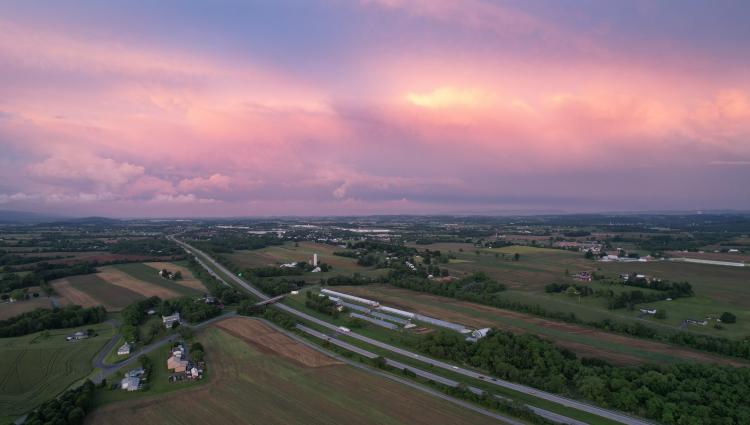
The Significance of Land Expansion in Farm Operations
Expanding your land is one of the best ways to grow your farm or ranch. More acreage increases production, improves crop rotation, and provides access to better soil and water resources. It also brings stability by reducing reliance on leased land, giving you greater control over your operations.
More land means more opportunities, but it also comes with financial challenges. That’s where farm real estate loans come in, providing farmers and ranchers with the capital they need to expand their land and grow their operations.
The Financial Roadblocks to Land Acquisition
There’s no way around it - buying farmland is expensive. Between land prices, closing costs, and the need for infrastructure improvements, the upfront investment can feel overwhelming. Even if you’re confident in making a land purchase, fronting such a large volume of money can disrupt cash flow and impede your existing farming operation.
In states like Delaware, Pennsylvania, Maryland, Virginia, and West Virginia, farmers often face fluctuating land values and limited availability, making the process even more challenging.
Farm Real Estate Loans: A Path to Expansion
A farm real estate loan helps turn your expansion plans into reality, giving you the financial support to acquire additional land without the large upfront cost.
Specialized lenders like Farm Credit offer tailored farm real estate loans designed to meet the unique needs of the agricultural community. These loans often feature competitive interest rates, flexible repayment schedules aligned with seasonal cash flows, and support for both experienced and beginning farmers.
Benefits of Farm Real Estate Loans
Farm real estate loans (or farm land loans) provide more than just funding. They offer:
- Competitive interest rates that help keep payments manageable
- Flexible repayment structures that align with your unique seasonal cash flow
- Access to funding for everything from land purchases to property improvements
- Support for beginner and seasoned farmers, whether you’re just getting started or already know everything there is to know, Farm Credit’s expert team is ready to help
From dairy farms increasing their herd size to grain farmers improving their crop rotations with additional acreage, the benefits of these loans don’t just look good on paper - they help farmers increase their operations’ value.
Applying for a Farm Real Estate Loan with Farm Credit
Applying for a loan can be intimidating - we get it. Farm Credit makes it straightforward, guiding you through every step of the application process:
- Determine your loan amount – Assess how much funding you need for your land expansion.
- Complete a loan application form – Loans require details about your farm operation, financial standing, and future plans.
- Submit required documents – This may include tax records, financial statements, and a business plan.
- Work with a lender – They’ll help you navigate the loan application and approval process, ensuring you understand your options available and next steps.
- Secure funding and close the deal – Once approved, you can finalize your land purchase and start making your expansion plans a reality.
Empowering New Farmers with Farm Real Estate Loans
New to farming? Real estate loans aren’t just for seasoned farmers - you can benefit too. Our beginning farmer loans feature relaxed underwriting requirements, customized loan terms, discounted pricing and reduced fees, collaboration with FSA loan programs, and the many benefits of being a cooperative member.
Farm Credit also offers additional resources, including mentorship programs, financial planning assistance, and specialized loan programs designed to support beginning farmers in building a sustainable operation.
Looking Forward: The Future of Farming with Land Expansion
The demand for farmland isn’t slowing down. With changing markets, evolving technology, and increasing food production needs, farm real estate loans will remain an important tool for farmers looking to grow, adapt, and invest in the future. By working with trusted lenders who understand agriculture, farmers and ranchers can secure the funding they need without unnecessary hurdles.
Grow Your Farm with the Right Financing Partner
Thinking about expanding your farm? A farm real estate loan could be the right step. To explore farm loan programs, and start the application process, contact Farm Credit today. Your farm’s future starts with the right financial partner - let’s grow together.
Please enter a valid password to access this page:
Wrong password. Try again!Newsroom
Making First Time Property Ownership Easy with Farm Credit

Henry S. Stoltzfus, First Time Rural Property Owner
When Henry S. Stoltzfus, Lancaster County, Penn., needed financing for a home on three and half acres, he began exploring options with local banks. “I talked to my dad, and he said, ‘Why don’t you try Farm Credit?’ Neither one of us knew if Farm Credit made home loans, but I decided to call and find out.”
Farm Credit: Financing more than farms
Henry discovered that Farm Credit could finance the property. A ranch-style house nestled off the main road, the property also included a 2-car garage that Henry could convert for use with his construction business. The acreage is a mix of woods and pasture, and an area for a garden.
How a Smaller Down Payment can Help Long Term
“At first, we planned for the traditional 20% loan down payment by securing an additional small loan from my dad,” Henry explained. “When we found out that we qualified for Farm Credit’s First Time Rural Property Owner (FTRPO)* program, it gave us a break. Since we needed 15% down payment, instead of 20% down, we were able to keep some of our savings for emergencies.”
Henry and his family moved into their new home at Christmas and two weeks later, a home repair emergency did develop. Henry tested the water, and the results revealed they needed to replace the home’s water system, requiring money from savings.
Henry also explained that the FTRPO program helped improve his cash flow and reduce stress. “With a construction business, the end of the year always is difficult because we’re not as busy. The smaller down payment makes more money available and eases our cash flow stress,” Henry said.
“For first-time homeowners, the hardest part is the down payment,” Henry said. “That 15% really helps.”
“I would recommend Farm Credit to others looking for a country home loan. Our lender was available when I was available,” he continued. “She was willing to talk to me in the evening and sign papers after work hours.”
Ask about our First Time Rural Property Owner Program
Affording your perfect country property can be a challenge today. If you've found the land with the perfect home, we’ve developed a program specifically for first-time rural property owners – to help you cut costs that matter. Financing is available for up to 85% of your purchase price or appraised value with no mortgage insurance for first-time rural property owners*. What does that mean for you? Financing a greater amount of your purchase/appraised price can help you keep money in your pocket for other improvements, should you wish to make them. No mortgage insurance means thousands of dollars in savings for you in the long run. Give us a call today to learn more about how Farm Credit can help you finance your perfect piece of country.
*Certain restrictions apply. This offer is subject to credit approval.
Please enter a valid password to access this page:
Wrong password. Try again!Newsroom
5 Ways Agricultural Loans Can Help Modernize Your Farm Equipment
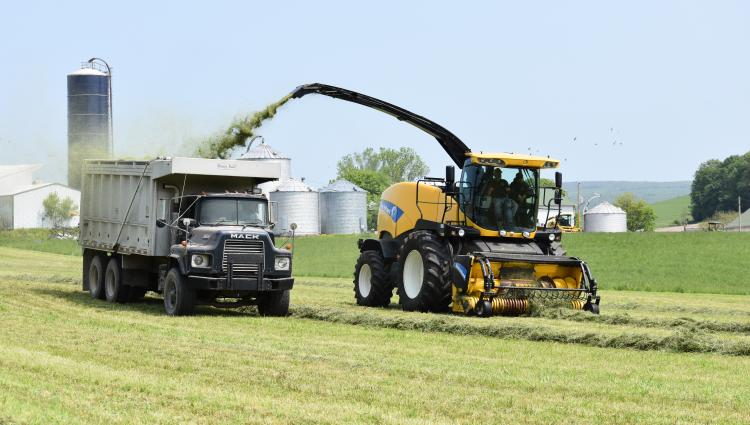
The Need for Modern Farm Equipment
Farming has evolved drastically over the years as technology reshapes how work gets done. With advances in agricultural equipment, tasks that once took days can now be completed in hours. High-tech tractors, automated irrigation, and precision planting tools have become staples of modern productive farms.
But upgrading to modern equipment comes with a hefty price tag. That’s where farm equipment loans step in, helping farmers invest in the tools they need to stay competitive and profitable – here's how:
Financial Challenges in Upgrading Farm Equipment
New technology often comes at high costs. Investing in ag innovations like autonomous tractors, robotic harvesters, or AI-powered crop monitoring systems can be a significant financial burden. For farmers in Delaware, Pennsylvania, Maryland, Virginia, and West Virginia, balancing the need for modern equipment with the reality of tight budgets can be tough. Thankfully, farmers have a few options for consideration - should they lease or refinance existing equipment, dip into their savings, or explore loan options?
Farm Equipment Loans: A Solution for Modernization
A farm equipment loan makes it easier to invest in technology without straining cash reserves or leasing needed equipment. Horizon Farm Credit provides financing solutions tailored to farmers’ needs, offering competitive rates, flexible terms, and the ability to secure loans through local dealerships.
With access to an equipment financing program offered by Farm Credit, farmers can spread out payments over time, making it easier to invest in the tools they need to bring their farm, and profit margins, into a new era.
5 Ways Agricultural Loans Can Modernize Your Farm Equipment
- Enhanced Productivity – Upgrading to newer machinery means fewer breakdowns, faster fieldwork, and increased output.
- Improved Efficiency – Automated equipment reduces labor costs, streamlines workflows, and saves valuable time.
- Increased Sustainability – Eco-friendly machinery lowers fuel consumption, improves soil health, and supports long-term conservation efforts.
- Better Crop Quality – Precision planting and harvesting tools result in healthier crops, higher yields, and reduced waste.
- Financial Flexibility – With variable rate loans and customized repayment plans, farmers can manage expenses without jeopardizing cash flow.
Applying for a Farm Equipment Loan with Horizon Farm Credit
Obtaining financing for your farm equipment doesn’t have to be complicated. Horizon Farm Credit offers a straightforward loan application process:
- Assess your equipment needs – Determine what tools will improve productivity, and how much they’ll cost.
- Explore financing options – Compare interest rates and repayment plans, and see which loans you’re eligible for.
- Submit your application – Provide financial details, farm operation records, business plans, and any other supporting documents.
- Secure funding and upgrade – Once approved, purchase your equipment and put it to work.
Supporting New Farmers with Farm Equipment Loans
For new, young, and beginning farmers, investing in agricultural equipment for their own operation or for their custom farming business can be overwhelming. Without established credit or large savings, getting access to financing might seem impossible. That’s why Horizon Farm Credit offers specialized loan options for new farmers, to make it easier for new farmers to access credit.
Additional resources like mentorship programs, financial planning assistance, and tailored loan packages help new farmers navigate the equipment-buying process with confidence.
Looking Ahead: The Future of Farming with Modern Equipment
The future of farming is high-tech. Innovations in automation, data-driven decision-making, and GPS-guided machinery will give farmers the extra productivity they need to stay profitable with increasingly squeezed margins. Farmers who invest in modern equipment today will be better positioned to adapt to tomorrow’s challenges - and equipment loans are here to help.
Contact Us Today!
Time to upgrade your farm equipment? Contact us today to learn about your farm equipment loan options with Horizon Farm Credit. Modern farming requires modern tools - get the funding you need to stay ahead.
Please enter a valid password to access this page:
Wrong password. Try again!Newsroom
Building Operational Excellence in 2025 and Beyond
The key to success for any farm operation lies in building a strong foundation that allows you to navigate challenges and seize opportunities. In this insightful conversation, Joe Waddell, Director of Marketing Innovation, explains how defining your mission, refining operations, and making data-driven decisions can help build a stronger, more sustainable future.
From defining your mission and vision to making data-driven decisions, Joe shares insights on:
- Aligning short- and long-term goals for better decision-making
- Professionalizing your operation to drive efficiency and accountability
- Understanding your operations fine details
- Innovating and making data-driven decisions that maximize profitability
- Leveraging your network and embracing change to stay ahead
Whether you're fine-tuning your farm’s direction or looking for ways to improve efficiency, this conversation is packed with actionable takeaways. Learn more by clicking play on the video above, and give our team a call at 888.339.3334 if you’re interested in getting in touch with Joe to dive into this topic deeper.
